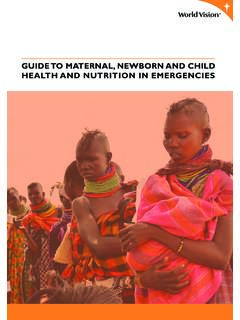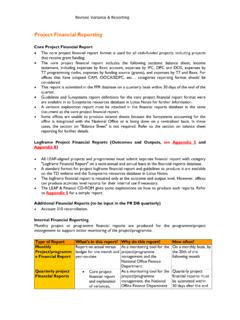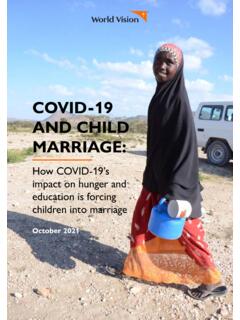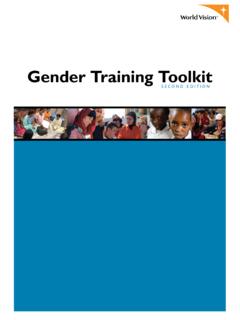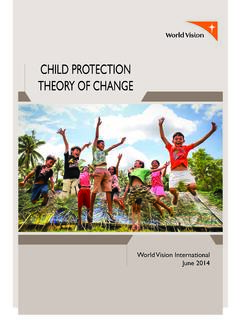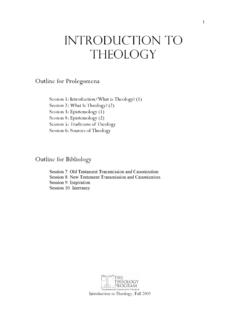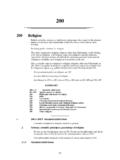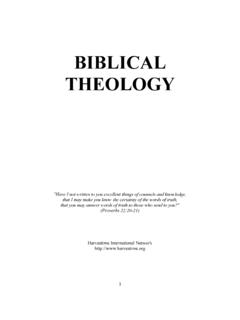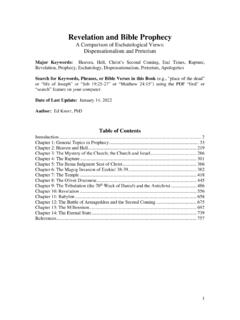Transcription of Why Are We Stewards of Creation?
1 Why Are We Stewards of Creation? World Vision s biblical Understanding of How We Relate to Creation May 2013 Jared Hyneman Christopher Shore Natural Environment and Climate Issues 2 World Vision International 2013 All rights reserved. No portion of this publication may be reproduced in any form, except for brief excerpts in reviews, without prior permission of the publisher. Published by Natural Environment and Climate Issues on behalf of World Vision International For further information about this publication or World Vision International publications, or for additional copies of this publication, please contact Authors: Jared Hyneman, Christopher Shore.
2 Content editing: Rebecca Russell. Copyediting: Katie Klopman. 3 Preface In 1989 World Vision put in place a defining document we call our Core Values. In it, World Vision outlines its basis for all its programmes and activities including a section on stewardship. That section states World Vision s foundational principle for all its policies and actions regarding environmental issues: We are Stewards of God s creation. We care for the earth and act in ways that will restore and protect the environment. We ensure that our development activities are ecologically sound. We are increasingly aware of the need to fully explain, enhance and develop these statements for our staff, for our partners, and for the sake of the communities and families we daily work alongside.
3 Likewise, humanitarian and development workers around the world are growing increasingly more aware of inevitable connections between care for human well-being and care for the natural creation. In response, the Natural Environment and Climate Issues team of World Vision presents this document explaining World Vision s biblical understanding of how we relate to creation together with a new document explaining the development theory basis for working on environmental issues, to clarify and support World Vision s work on environmental issues. World Vision must root its work in solid development theory.
4 As a Christian agency, we are also compelled to root our work in how we understand our relationship with God s creation. This paper is written in the context of significant challenges the world is facing: 1. Global population is expected to reach 9 billion people by the year 2. Climate changes are becoming increasingly destructive to the environment. 3. Roughly 1 billion people currently live in absolute What does this mean? Global experts predict that food production in developing countries will need to almost double by 2050 to meet the food needs of the rising population, particularly in light of the increasing prosperity and consumption of some population However, do we increase food production by cutting down forests, increasing irrigation in scarce-water contexts or depleting soil nutrients with extensive monocrops?
5 Many well-intended efforts bring unintended, but well-documented, consequences. And degraded environments worsen the impacts of climate change. World Vision is already seeing the significant effects of climate change in fragile regions on the people whom we serve. Moreover, climate change is currently affecting nearly all food-growing regions of the world, even in prosperous nations one example is the severe drought challenging the main winter wheat growing areas of the United States as this document is being written. So, the challenges we face are not theoretical. They are immensely practical.
6 They are affecting people right now in both the developing and developed world. 1 United Nations Department of Economic and Social Affairs, Population Division, World Population Prospects, xiii. 2 United Nations, billion people living in absolute poverty makes its eradication humankind s most significant challenge, Second Committee told . 3 How to Feed the World in 2050, Global agriculture towards 2050, 2. 4 Questions World Vision encounters include: What sustainable and long-term information do we provide small-holder farmers in places like Africa about how they should work their farms given the environmental challenges their part of the world will be facing?
7 What actions should we promote with rural communities as we see drought cycles grow increasingly frequent? Is it World Vision s business to be thinking about environmental challenges facing communities, nations and continents? How should we document and share what we witness unfolding? Do we worry about water and soil management for small-holder farmers, or is this too distantly related to child well-being? How should we advise people living near coastlines in island nations such as the Philippines or Indonesia, as ever more powerful storms hit such regions? Many millions of people live in these areas, often depending on fishing for their living, and lacking resources to relocate.
8 Do we speak with friends in the developed world about how their specific actions may be contributing to environmental problems elsewhere in the world? Is this World Vision's role? How can we talk to our friends in the developed world where certain discussions, politics and policies regarding climate change are stunted by oversimplifications and misunderstandings, or are even sometimes considered to be things Christians should not be involved with? Many voices in the world including the Christian world express very divergent views about the environment. Some loud and powerful voices assert that nature's only role is to promote human prosperity.
9 Others loudly endorse the other extreme and seem to worship the creation, rather than the Creator. While these questions could be debated endlessly, World Vision faces the very practical situations described above. That is, environmental degradation and an increasingly turbulent climate are already daily affecting many of the children and families we serve. To stand with them, we need answers and action now. Do we frame our thinking only on development theory? World Vision, as a Christian organisation, has more than practical, historic or development theory reasons for acting. We have the biblical narrative, church history, and our creeds and doctrines to inform us and to rely on.
10 So how do we humans relate to creation? Is this something we need to take seriously? Why does World Vision assert that we are Stewards of creation? Does the Bible provide us with guidance for how to think about creation? What is the biblical perspective on creation? This document is not intended to be the ultimate theological answer to the infinite questions humankind faces in detailing how to relate to creation. It is not built on an established systematic theology, with a view from there to issues of the creation. Rather, this brief overview attempts to address a very practical and specific set of questions arising regularly amongst development workers from our area development programmes to our World Vision national offices to our international support offices and Global Centre offices to our leaders.
